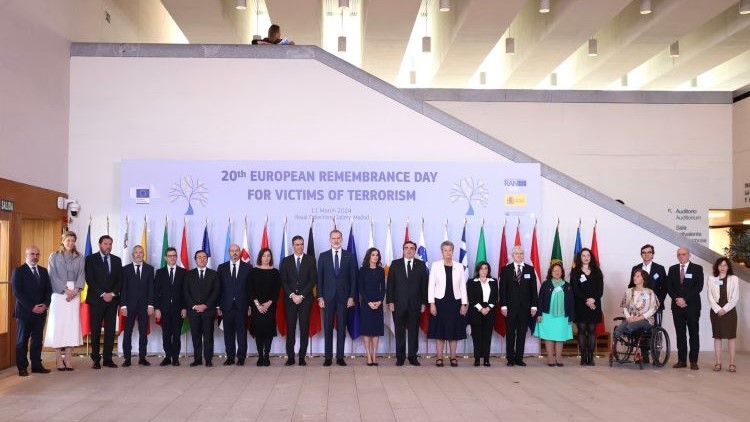Eduardo González
Yesterday, King Felipe VI, the President of the Government, Pedro Sánchez, and the European Commission commemorated the European Day in Remembrance of Victims of Terrorism, which coincided with the twentieth anniversary of the attacks perpetrated in Madrid in 2004, in which 192 died. people and 1,893 were injured.
The event took place in the Gallery of the Royal Collections of Madrid and was attended by the vice-president of the Commission and commissioner for the Protection of the European Lifestyle, Margaritis Schinas; the European Commissioner for Home Affairs, Ylva Johansson; the Ministers of Foreign Affairs, José Manuel Albares; Interior, Fernando Grande-Marlaska; Presidency, Justice and Relations with the Cortes, Félix Bolaños; Transport and Sustainable Mobility, Óscar Puente; the president of Congress, Francina Armengol; the president of the Senate, Pedro Rollán; the Minister of the Interior of Belgium, Annelies Verlinden; and representatives of victims of terrorism, among others.
The European Day of Remembrance of Victims of Terrorism was established in 2005 in memory of the attacks of March 11, 2004 in Madrid. During the event, Pedro Sánchez recalled that, “20 years ago, this was a city shocked, deeply wounded” by the 11-M attacks and warned of the need to remember the victims “for a matter of dignity” and because “this memory must keep alive the memory of what happened in the past, but it must also be an incentive for the present and the future, so that it is not repeated, and so that the victims, survivors and relatives always have our solidarity and our affection.”
The President of the Government also highlighted the importance of “defending the human rights that terrorists deny”, of “reinforcing the rule of law, which is its main vaccine”, and of “protecting Europe, not only as a physical space, but as an ideal of justice and freedom, of humanist and civilizational values.” “Democracy, the rule of law and social rights are the hallmarks of a united Europe that fanatics, whatever their stripe, will never be able to destroy.” “Fighting terrorism also means acting against the causes that fuel regional conflicts, poverty and underdevelopment; it means preventing fanatics from transforming desperation into a weapon to attack the principles of freedom and respect for human rights, so associated with the ideal.” European”, he concluded.
The event was closed by the King, who recalled that, “twenty years ago, on a day like today, what was the most serious terrorist attack in our country and also in the EU was perpetrated in Madrid, a tragedy that brutally hit society, plunging all of us into a great commotion.”
“The history of terrorism in Europe is the history of shared suffering, but also of solidarity among all Europeans,” because “where there has been a terrorist attack, there has always been an extraordinary social response; an immediate action, a kind gesture, an encouraging attitude; This is what happened in Madrid, which was completely mobilized in the face of tragedy and horror,” he continued.
“This is what happened in Madrid, which was completely mobilized in the face of tragedy and horror,” the Monarch recalled. “That Thursday, March 11, Madrid was a true example of solidarity that we continue to admire twenty years later,” he highlighted. “The professionals of the public emergency services, health, firefighters, the Security Forces and Corps, the city, the Community and national, and also so many citizens, all gave the best of themselves to help and care for the injured. and the relatives of the victims, most of them workers and students, of multiple nationalities. In the worst situation, the human being showed that he was capable of the best,” he said.
“More than eleven million people took to the streets in the main cities of our country to convey a strong message against terrorism,” recalled the King. “So, we were not alone, and we feel that way,” he stressed. “Solidarity crossed borders,” but “the feelings and emotions were expressed in the same language,” said the King. “Europe and the entire international community expressed their support to us, both institutionally and socially, as we Spaniards have also done with all the victims of terrorist attacks wherever they occurred, near or far, in Europe or on any continent,” he added. the monarch.
Next, Don Felipe and Doña Letizia held a meeting with the victims of terrorism who gave their testimony during the commemorative event, with the ambassadors and with all attendees.
During the same event, Philippe Vansteenkiste and Ana Isabel Rodríguez, co-leaders of the Victims and Survivors of Terrorism Working Group of the Radicalization Alert Network, presented the testimonies of three victims of terrorism, Ana Cristina López, Rudolf Kaniski and Eliana Pavoncello, followed by a minute of silence in memory of the victims of terrorism. “The event left its mark on me forever, but it also left me with the most incredible image of solidarity that anyone could imagine,” declared Ana Cristina López Royo.
European Comission
On the other hand, the president of the European Commission, Ursula Von der Leyen, yesterday paid a “tribute to the victims” of 11-M and highlighted “the courage of the survivors and the resilience of the nation.” “The memory of victims of terrorism everywhere inspires us to act and unite, to prevent and combat terror in Europe and internationally,” she added.
In a press release yesterday, the Commission was “firmly committed to supporting victims in rebuilding their lives.” “In the framework of the EU Strategy on Victims’ Rights (2020-2025), we recognize that victims of terrorism require specialized support and protection” and, therefore, “through initiatives such as the Center of Experts on EU Victims of Terrorism, we ensure the effective implementation of EU rules on victims’ rights and raise awareness of the rights and needs of victims of terrorism in the EU,” the Commission continued.






